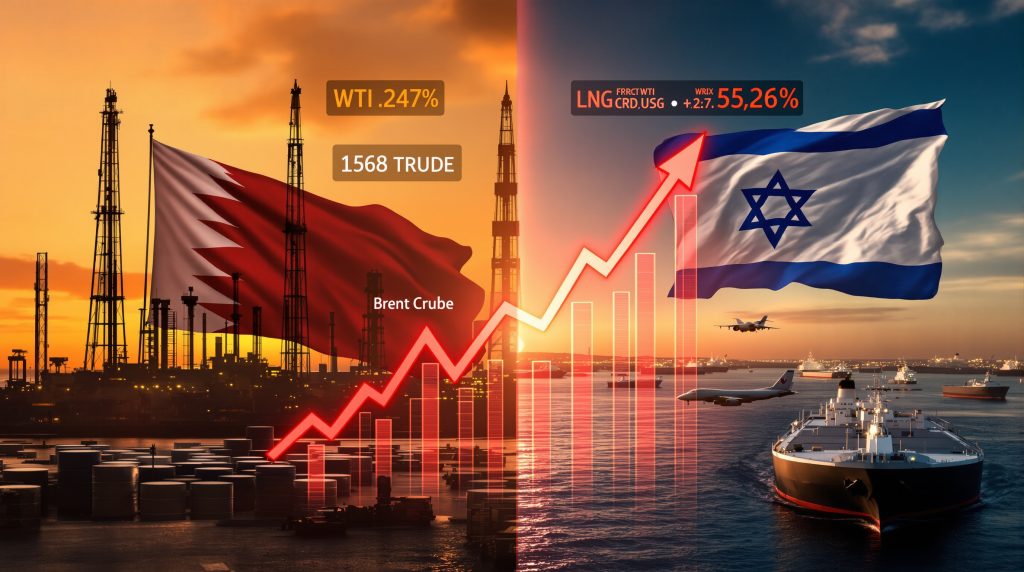Oil Markets and Geopolitical Tensions: Understanding Market Reactions
Geopolitical events can significantly impact global oil price movements, as we've seen throughout history. When tensions rise in major oil-producing regions, markets typically respond with volatility as traders assess potential supply disruptions.
The Role of Qatar in Global Energy Markets
Qatar plays a strategic role in global energy markets despite not being among the world's largest crude oil producers. The nation's significance stems from several key factors:
-
Natural Gas Powerhouse: Qatar ranks as one of the world's leading liquefied natural gas (LNG) exporters, producing approximately 77 million tonnes of LNG in 2022
-
Regional Stability Factor: The country hosts Al Udeid Air Base, the largest U.S. military facility in the Middle East
-
Gulf Energy Infrastructure: Qatar's geographic position makes it integral to regional energy security networks
-
Financial Influence: As a major energy exporter, Qatar wields significant influence in global energy investment
How Oil Markets Respond to Geopolitical Events
When geopolitical tensions arise in key energy-producing regions, oil markets typically demonstrate predictable patterns:
-
Risk Premium: Traders quickly incorporate potential supply disruption risks into prices
-
Volatility Increase: Market uncertainty leads to greater price fluctuations
-
Regional Price Differentials: Price spreads between different crude grades may widen based on proximity to tension zones
-
Hedging Activity: Major consumers and producers increase hedging to manage price uncertainty
Current Middle East Tensions and Energy Security
The Middle East remains a critical region for global energy markets, with ongoing tensions affecting market sentiment:
-
Maritime Security: Concerns about shipping security in the Persian Gulf and Red Sea periodically affect oil transport costs
-
OPEC+ Dynamics: The producer group's decisions continue to significantly influence global oil supply and pricing
-
Iran's Position: Iran's role as both a major oil producer and supporter of various regional groups adds complexity to market calculations
-
Infrastructure Vulnerability: Energy facilities and transportation routes remain vulnerable to disruption
Regional Impact on Global Energy Markets
Different regions experience varying impacts from Middle Eastern energy disruptions:
Asia's Energy Security Challenges
As the world's largest oil-importing region, Asia faces particular challenges from Middle Eastern instability:
-
Supply Chain Exposure: Heavy dependence on Middle Eastern energy supplies creates vulnerability
-
Price Sensitivity: Many Asian economies are particularly sensitive to energy price fluctuations
-
Limited Strategic Reserves: Some Asian nations have less robust strategic petroleum reserves to buffer shocks
-
Refinery Configuration: Many Asian refineries are optimized for Middle Eastern crude grades
Europe's Energy Balancing Act
Europe continues to navigate a complex energy security landscape:
-
Diversification Efforts: Ongoing attempts to reduce dependence on any single energy supply source
-
Mediterranean Security: Increased focus on energy security in the Mediterranean basin
-
Transition Acceleration: Potential for accelerated renewable energy development as a security measure
North American Energy Position
The North American energy position provides some insulation but not immunity:
-
Production Flexibility: U.S. producers may respond to price signals with production adjustments
-
Global Price Exposure: Despite production strength, North American consumers remain exposed to global price movements
-
Strategic Reserve Decisions: Potential deployment of strategic reserves to moderate price impacts
-
Export Opportunity: Higher global prices may enhance the competitiveness of North American energy exports
Investment Considerations During Geopolitical Uncertainty
Investors should consider several factors when navigating energy markets during periods of geopolitical tension:
Critical Market Signals
Several key indicators provide insight into market dynamics during geopolitical tensions:
-
Futures Curve Structure: Changes in the relationship between near-term and longer-dated futures contracts often signal market expectations
-
Options Market Activity: Shifts in options pricing reflect changing risk perceptions
-
Inventory Reports: Weekly oil inventory data might signal supply chain adjustments
-
Refinery Margins: Changes in refining profitability can indicate supply/demand imbalances
Policy Response Possibilities
Government and institutional responses can significantly shape market outcomes:
-
Coordinated Reserve Releases: Major consuming nations may coordinate strategic petroleum reserve releases
-
Diplomatic Initiatives: High-level diplomatic efforts to contain regional tensions
-
Producer Communications: Strategic messaging from major producers about supply stability
-
Consumer Nation Measures: Potential demand management policies in major consuming countries
Historical Precedents for Geopolitical Oil Shocks
Historical events provide context for understanding how markets might respond to future tensions:
-
The 2019 drone attacks on Saudi Aramco facilities caused a brief 15% spike in oil prices
-
The 1990 Iraqi invasion of Kuwait led to a doubling of oil prices
-
The 1973-1974 oil embargo resulted in a fourfold increase in oil prices
-
More recent regional tensions have shown markets can be resilient when alternative supplies exist
Long-Term Energy Security Considerations
Beyond immediate price effects, geopolitical tensions highlight several structural energy security challenges:
-
Geopolitical Vulnerability: The enduring vulnerability of global energy supplies to regional conflicts
-
Diversification Imperatives: The continued importance of supply diversification for energy-importing nations
-
Strategic Reserve Policies: The role of strategic reserves in managing short-term supply disruptions
-
Energy Transition Implications: How geopolitical instability might affect the pace and nature of the global energy transition
Navigating Uncertain Energy Waters
Energy market participants should prepare for continued volatility as geopolitical tensions evolve. Price movements during periods of uncertainty reflect not just current supply concerns but the potential for broader regional destabilization that could threaten energy infrastructure and transportation routes.
For global energy security, geopolitical tensions underscore the persistent vulnerability of energy markets to shocks despite advances in production diversification and energy transition efforts. The diplomatic response to regional tensions remains critical in determining whether incidents remain contained or signal more profound shifts in regional security dynamics with lasting OPEC market influence on global energy markets.
Key Factors to Monitor
When assessing potential impacts of geopolitical tensions on energy markets, observe:
-
Diplomatic Statements: Official responses from involved parties and key allies signal the diplomatic trajectory
-
Insurance Premiums: Changes in shipping and facility insurance costs reflect risk assessment
-
Production Strategy Signals: Any shift in OPEC production impact from major producers in response to tensions
-
Military Movements: Repositioning of naval assets in affected regions could indicate escalation concerns
Furthermore, the ongoing oil price stagnation in certain regions must be considered alongside potential global tariff implications that could further complicate the energy landscape. As evidenced by recent price drops below projected thresholds, markets remain highly responsive to both geopolitical and economic factors.
Disclaimer
This article is provided for informational purposes only and does not constitute investment advice. Energy markets are subject to rapid change due to unpredictable geopolitical events. Investors should conduct their own research and consult with qualified financial advisors before making investment decisions.
Looking to Capitalise on the Next Major Mineral Discovery?
Discovery Alert's proprietary Discovery IQ model helps investors gain a market-leading edge by instantly identifying significant ASX mineral discoveries and transforming complex data into actionable insights. Explore how historic discoveries have generated substantial returns by visiting Discovery Alert's dedicated discoveries page and begin your 30-day free trial today.




